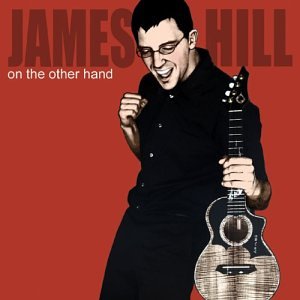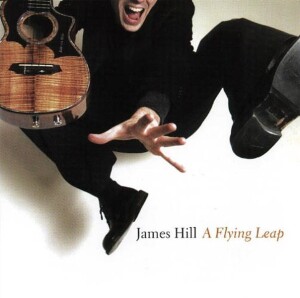 James Hill is a ukulele player. “Plunk, a-plunk-a-plunk … ” that’s what you’re thinking isn’t it? James Hill is 23 years old. He graduated from the University of British Columbia’s School of Music, where he studied violin and viola. He has performed as a violist with a half-dozen different orchestras or groups. He studied jazz theory, improvisation, and electroacoustic music. But, let me tell you … James Hill is a ukulele player.
James Hill is a ukulele player. “Plunk, a-plunk-a-plunk … ” that’s what you’re thinking isn’t it? James Hill is 23 years old. He graduated from the University of British Columbia’s School of Music, where he studied violin and viola. He has performed as a violist with a half-dozen different orchestras or groups. He studied jazz theory, improvisation, and electroacoustic music. But, let me tell you … James Hill is a ukulele player.
I remember the first time I heard Jimi Hendrix. I stood amazed at the sounds he was drawing out of an instrument I thought I understood. He did things with an electric guitar that I hadn’t imagined, hadn’t thought possible. James Hill does that with the ukulele. Accompanied only by Mark Luongo on acoustic and electric bass, Hill will make a believer out of you. Give him a chance.
When I came back from my trip to Hawaii last summer, I carried a small bag. I handed it over to the people at customs when they asked, “Do you have anything to declare?” The officer took the bag, turned it around, unzipped it and asked, “What is this?” “It’s a musical instrument,” I offered. “Hmmm.” Hill’s accomplishments on this album justify my claim. This little “jumping flea” finds its possibilities expanding in the hands of this master. And he’s from Canada, no less!
On the Other Hand is Hill’s second album. The first was reviewed here a year or so ago. Playing It Like It Isn’t was an amazing collection of standards given the ukulele workout by Hill; this time he has composed nine of the 13 pieces himself. He begins with a powerful rendition of the classic “Misirlou.” If you know this tune from Dick Dale’s blistering guitar solo, featured in Pulp Fiction, you’ll be pleasantly surprised to hear the presentation Hill gives it. He gets an awful lot of tone out of that uke!
“Eucalipstick” is a jazzy Hill-composed number that gracefully slips along like a Fred Astaire dance. Moving from theme to theme, Hill also varies the tempo, using the ukulele as a percussion instrument: creative and swinging. This juxtaposition of different themes in one piece continues on the next track. “Dance for Eight Legs” is “… not necessarily about spiders but it could be,” Hill claims. It could be the soundtrack to a short film tracking an arachnoid day-in-the-life — spinning a web, skittering along the floor, climbing the wall — or it could just be an intriguing piece of music, beautifully played on a uke. “Lullaby on a G String” echoes older lullabies, hinting at melodies remembered from the past but never quoting them. It’s a lovely display of the tone Hill can draw from his instrument.
Hill’s own compositions are a mixed bag, sometimes semi-classical, sometimes pop, but they stretch the limitations of the uke. Chording is mixed with quick runs, rhythm is steady; Hill is a master. He also has a sense of humour. He covered the “Super Mario Bros. Theme” on his first album, and here he offers a jazz interpretation of the “Inspector Gadget Theme,” on the one hand and “Mos Eisley Spaceport” (“Cantina Theme from Star Wars“) on the other hand.
You’ll be amazed at this young man’s virtuosity. You’ll be struck by the musicality of the instrument. You’ve never heard a ukulele sound like this. I was playing the album in the office, and Spike walked in, shook his head, turned on his heels and said “you wish you wuz back in Hawaii don’tcha?” It’s true … but a little hot pickin’ an’ strummin’ from James Hill can go a long way toward warming up these frosty nights.
(self-released, 2004)
“Wot! Another ^#$%in’ ukulele record!?!” That’s what Spike said when I placed James Hill’s new CD in the player. It begins with a quiet bit of strumming, which sounds like the introduction to a beginner’s uke lesson. And then James gets into the tune and plays it like he can. The song is called “Uke Talk” and it makes a fine introduction to James’ third self-released CD. It’s one of three tunes on the album that James didn’t compose.
His own “Song for Cheri” comes next and it’s a jaunty exercise in fingerpicking. His tone is rich and rounded. He plays a custom GString uke that sounds wonderful. He is backed on the whole album by … well … he plays a bit of bass, and the uke. And Anne Davison adds cello to three tracks. But mainly it’s James Hill’s show.
He’s a clean, virtuosic player. That’s not easy on these small instruments, moving around on the narrow neck, between frets which don’t make the same allowance that guitar frets do. “Down Rideau Canal” is a multi-tempoed piece that sonically describes a boat ride in Canada’s capital. Then Hill takes on Jimi Hendrix’s “Little Wing.” He begins slowly and gently with strumming on the G string acoustic uke, and then in comes a new sound. The RISA solid-body electric ukulele. Bluesy and true, Hill pays tribute to the king of the electric guitar!
Then he shows his classical bent with an original piece, “One Small Suite for Ukulele.” It has three movements, just like real classical music! The first is “Allegro con brio,” quick, rhythmic and vibrant, then “Largo cantabile,” a more meditative section, and finally “Vivace giacoso,” the almost frantic conclusion. Through it all, Hill maintains a sense of melody above all. This is where the cello comes in, but it’s really James’s ukulele that is the star.
“Fleas My Dog Has” takes its punning title from the familiar tuning reminder used for years to tell kids how to tune their ukes — which James then turns on its head. “Skipping Stone” adds a touch of percussion, but just a touch. Then Hill concludes the album with the familiar melody of the theme from “Never On Sunday.” Originally written for bouzouki, the melody translates well to the uke, and makes for a satisfying end to the album.
James Hill has progressed well on his three solo albums, and here displays new confidence in his composition and his interpretation. His technique? Well, there was never any question about that.
(self-released, 2005)

